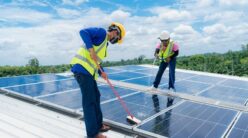 The Growing Demand for Solar Energy in Business
The Growing Demand for Solar Energy in Business
With rising energy costs and increasing environmental concerns, more UK businesses are asking whether it makes financial and operational sense to install solar panels. Renewable energy solutions have moved from fringe consideration to mainstream strategy, with solar power leading the charge. As companies look to reduce overheads, future-proof their operations, and demonstrate sustainability, installing solar panels is no longer just a green gesture—it’s often a smart business decision.
Financial Benefits of Solar Installation
One of the biggest incentives for installing solar panels is the potential for significant cost savings. By generating your own electricity, your business can reduce its reliance on grid energy and avoid the worst of fluctuating energy prices. Depending on your energy usage and the size of the installation, many businesses see a return on investment within five to ten years.
The UK Government also supports renewable energy adoption through various schemes. Businesses may benefit from incentives such as the Smart Export Guarantee (SEG), which allows you to earn money by selling excess electricity back to the grid. This not only helps cover installation costs over time but also turns your business into a micro energy producer.
Additionally, solar installations can reduce long-term operating expenses and provide more predictable energy bills, which is particularly valuable during periods of economic uncertainty.
Environmental Responsibility and Brand Image
Consumers and clients increasingly favour businesses that demonstrate environmental awareness. Installing solar panels is a tangible way to reduce your carbon footprint, with immediate impact. This can form a key part of a broader sustainability strategy, helping you to meet environmental targets or even work towards becoming a net-zero business.
Demonstrating your commitment to renewable energy can also strengthen your brand image. For companies in industries such as retail, hospitality, manufacturing, or tech, showcasing a proactive approach to sustainability can make a significant difference when attracting environmentally conscious customers, investors, and partners.
Assessing the Practicality of Solar for Your Business
Whether solar is right for your business depends on a few practical factors. The first consideration is the suitability of your premises. Most solar panels are installed on rooftops, so it’s important to assess the size, condition, and orientation of your roof. South-facing roofs generally offer the best performance, but east- and west-facing installations can still provide meaningful output.
For businesses without suitable roof space, ground-mounted systems or solar canopies over car parks may be an alternative. You’ll also need to consider whether your property is owned or leased. If you lease the premises, permission from the landlord will be required, and you may want to consider shorter-term arrangements or portable systems.
Energy Usage and System Sizing
The scale of your solar panel installation should be based on your typical energy usage. If your business operates during daylight hours, such as retail stores, offices, and schools, you’re likely to use a large proportion of the energy generated on-site. This helps maximise the benefits of solar, as self-consumed electricity is more valuable than electricity exported to the grid.
For businesses that operate outside daylight hours, such as restaurants, entertainment venues, or logistics depots, adding battery storage could be beneficial. Batteries allow you to store excess energy generated during the day and use it in the evening when demand spikes or grid prices are higher.
Working with a solar installer who can perform a site assessment and energy audit is crucial in designing a system that matches your needs and maximises your savings.
Maintenance and Longevity
Solar panels require very little maintenance and are designed to last for decades. Most systems come with warranties of 20 to 25 years, though panels can often continue performing well beyond that with minimal degradation.
Routine cleaning and occasional inspections are usually all that’s required. Inverters—the part of the system that converts solar energy into usable electricity—may need replacing after 10 to 15 years, which should be factored into the long-term cost analysis.
Because solar systems have no moving parts, they are less likely to suffer from mechanical failures, offering reliable performance year after year.
Funding and Financing Options
The initial cost of solar panel installation can be a barrier for some businesses, but there are a range of financing options available. From outright purchase to leasing or power purchase agreements (PPAs), businesses can find a model that aligns with their financial strategy.
A capital investment approach means the business owns the system outright and benefits from all associated savings and incentives. Alternatively, under a PPA, a third party installs and maintains the system at no upfront cost, and the business pays for the electricity used, often at a lower rate than standard grid prices.
Some businesses may also qualify for green finance schemes through banks or local councils, specifically aimed at encouraging investment in sustainable technology.
Solar Energy in Different Business Sectors
The flexibility of solar power makes it suitable for a wide range of sectors. Agricultural businesses can install panels on barn roofs or unused land, reducing energy costs for machinery or cold storage. Industrial and manufacturing companies can offset energy-intensive processes. Offices and retail premises can lower daytime energy bills, while also presenting an eco-friendly image to clients.
For companies with multiple sites, rolling out solar across several buildings can deliver substantial savings and operational consistency. Even smaller businesses can benefit from solar, particularly in the face of rising energy bills.
Making the Decision
Ultimately, deciding whether to install solar panels depends on your long-term business goals, property suitability, and financial outlook. If reducing costs, improving sustainability, and gaining greater energy independence are part of your company’s strategy, solar is a powerful tool worth considering.
Conducting a feasibility study with a reputable solar provider will help you assess your options, from system design to funding models. As energy costs continue to fluctuate and carbon reduction becomes a higher priority, solar power offers a practical, future-facing solution that supports business resilience and growth.





